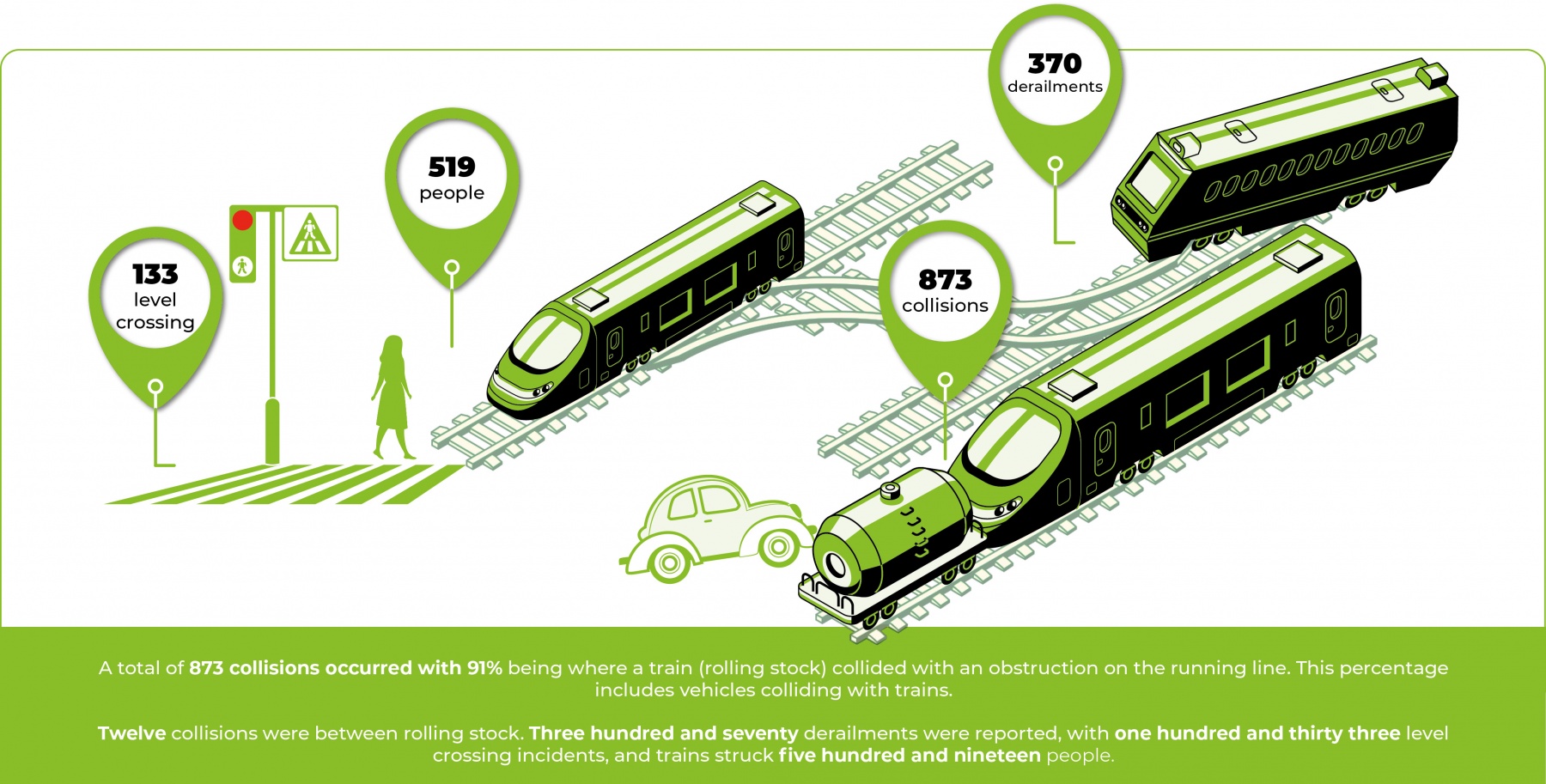Railway Safety – protecting communities, the environment and assets
Millions of people around the world make use of trains for their daily commute. In South Africa, around 1,000,000 people travel by train daily in the larger metropolitan areas of Gauteng, KwaZulu-Natal and the Western Cape provinces.
With these many passengers using trains as a mode of transport, railway safety is paramount for rail operators. Rail safety does not only apply to passenger rail but also includes the safe transportation of freight across South Africa. In South Africa, the Rail Safety Regulator oversees and enforces safety compliance by railway operators and owners. Transnet, PRASA and the Gautrain are the three prominent railway operators in South Africa, with several private operators and rail siding owners, from mines and mineral processing plants to municipalities. All network, train and station operators and owners have to obtain safety permits and must submit a comprehensive SANS 3000-1:2016 compliant railway safety management system to the Rail Safety Regulator for review.
Why is it essential to have a uniform and integrated approach to the management of railway safety and security? The primary focus of railway safety is to protect communities, the environment and assets from potential incidents and accidents.

Looking at the statistics and given the current state of the South African economy, it is apparent that the focus for all railway operators will be on asset management as opposed to capital expenditure and upgrades. Railway Safety is non-negotiable, and this needs to be a key discussion point when the industry starts recovering and getting back to business as usual.
At Bigen, we identified a potential gap for Network Operators that may not have railway safety as a key performance indicator in their business scorecard. The omission of a KPI is because the network is not generating any income resulting in a business decision not to capacitate and support the network and deployment of resources to support compliance to railway asset maintenance, condition monitoring and the implementation of a safety regime.
Bigen provides professional services to siding operators and owners, with a focus on assisting and capacitating them in the establishment of:
- A Railway Safety Management System
- Safety Permit applications
- Asset Condition Monitoring and Maintenance Planning.
We are passionate about railways and safety is paramount in operations, primarily because the impact on non-compliance can affect not just assets but people. Some of the sidings owned by private operators and networks affect communities as much as businesses.
Our offering ensures that we assist operators in establishing a Safety Management System that looks beyond the commercial value and asset protection but furthers the safety of communities and the employees that get to keep their jobs as a result of safer and secure sustainable operations.
The Interface Management between Operators and the Railway Safety Regulator is critical, especially for private network operators. Regulations and compliance requirements that may not be standard practice to the private network owner, due to the limited extent of operation within their network, might create a perception that there is exemption but incidents and accidents have the same effect on all operations.
Railway Safety Regulator’s mandate includes the following activities:
- Issue and manage safety permits
- Conduct inspections and audits to critically assess safety systems and processes of operators
- Investigate railway occurrences to achieve safety improvement and reduction of occurrences
- Develop regulations, safety standards and related documents as an integral part of the regulatory regime adopted for the promotion of safe railway operations
- Co-operate with relevant organs of state to improve safety performance and oversight function to eradicate duplication where there is dual jurisdiction
- Issue notices of non-conformance and no-compliance to indicate conditions within the operators’ system that are deemed sub-standard or not in compliance with regulatory prescripts.
The scope of SANS 3000 includes:
- SANS 3000 applies to network, train and stations operators, singly or in a combination of two or three of them as well as interested and affected parties as contemplated in the relevant national legislation;
- SANS 3000 describes the elements of an SMS, which are amplified in other parts of the SANS 3000 series of standards to enable an operator to develop an SMS for the management of safe railway operations under the operator’s control;
- SANS 3000 covers the railway occurrence and security incident information to be captured and managed by the operator to maintain and improve the safety and security of railway operations;
- The information is to be provided to the relevant National Railway Safety Regulator (RSR) regarding railway occurrences and security incidents to enable this body to fulfil its mandate; and
- It also covers the circumstances that will necessitate changes to an operator’s SMS.